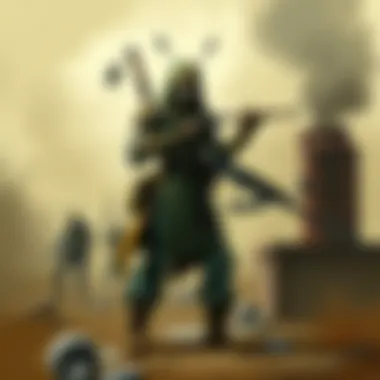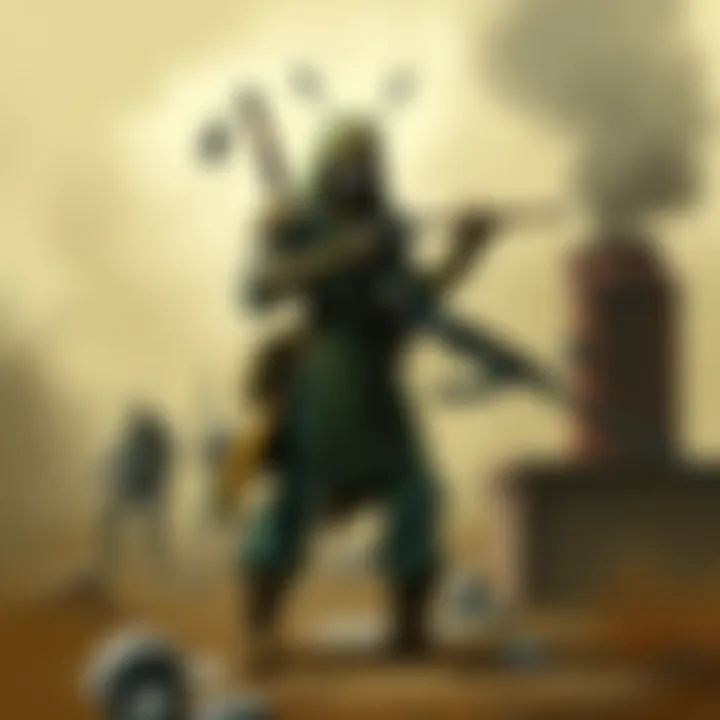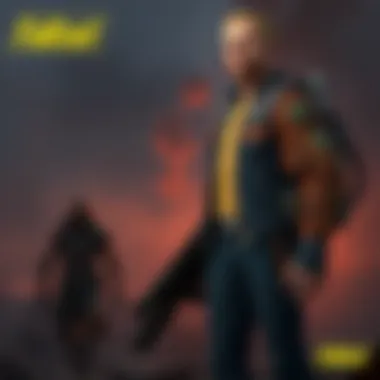An In-Depth Look at Fallout: Insights and Impact


Intro
The world of Fallout is a vast and intricate landscape filled with rich narratives and memorable characters. This series has grown from a single title into a franchise that now spans several games, each offering its own unique spin on the post-apocalyptic narrative. Fallout isn't just a game; it’s a cultural phenomenon that has captivated audiences for decades.
From stray raiders scavenging through the ruins of what was once a bustling city to colossal super mutants terrorizing the landscape, the lore of this universe is deep and complex. Players are not just participants but also historians, piecing together histories where civilization crumbled yet remained profoundly human.
In this exploration, we will comb through the various elements that make up this beloved series, delivering insights for both seasoned players and those freshly exposed to its desolate beauty. By examining the intro and exploration of its lore, the nuances of gameplay, character analysis, and the ever-evolving community dynamics, we aim to provide you with a comprehensive guide. So, grab your Pip-Boy and let’s venture together into the wasteland of thoughts, ideas, and shared fandom.
Lore Insights
Overview of the Fallout Universe
The Fallout universe is born out of a unique blend of alternate history, retro-futurism, and dark comedy. The series is set in a world that diverged from our own during the post-World War II era, with a heavy emphasis on the fear of nuclear annihilation. The 1950s aesthetic, combined with sci-fi technology that never quite developed, creates a truly distinctive ambiance.
Key historical events in the Fallout timeline
The timeline showcases defining moments that shape the landscape:
- The Great War: This event marks the nuclear devastation that obliterated large parts of the planet, signaling the birth of the Fallout world, setting the stage for the chaotic aftermath.
- The rise of Vault-Tec: Vault-Tec introduces numerous underground shelters known as Vaults, designed to protect a select few from nuclear fallout. These Vaults often become test beds for social experiments that drive the narratives in later games.
- The emergence of factions: Various factions rise in the power vacuum left by the obliteration of governments, each driven by differing ideals - from the authoritarian Brotherhood of Steel to the anarchistic Raiders, each contributes to the rich tapestry of the lore.
Deep dive into the backstory of major factions and characters
The interplay between factions adds depth to the narrative. For instance:
- The Brotherhood of Steel: Arising out of the remnants of the U.S. military, they prioritize technology and preservation; their philosophy often puts them at odds with other groups.
- Caesar's Legion: This brutal, slavery-driven faction draws inspiration from Rome, posing a stark contrast to the libertarian ideals of others. Their despotism provides a dark reflection on leadership.
- Notable characters: Figures like Piper Wright and Nick Valentine offer players a taste of diverse backgrounds and motivations, highlighting the moral complexities present in Fallout’s universe.
"In an age of darkness and despair, the choices players make within the Fallout universe reveal not just survival tactics but also define what it means to be human."
As players navigate through quests and moral dilemmas, they must often choose between their own self-interest and the greater good, leading to a rich, narrative-driven gaming experience.
Gameplay Tips and Strategies
Beginner's guide to playing Fallout games
Stepping into the shoes of a vault dweller can be daunting:
- Start exploring early. Don't rush the main quest; take the time to talk to NPCs and complete side quests.
- Embrace the V.A.T.S. system for strategic combat; it’s your best friend, especially in nerve-wracking encounters.
Weapon and armor recommendations
Weapon choice is vital:
- Early on, the 10mm Pistol is reliable and widely available.
- Don't neglect melee combat; it's often quieter and can conserve ammo.
- As you progress, aim for energy weapons like the Laser Rifle, which pack a good punch.
Tips for efficient resource management
Resources can dwindle quickly in the wasteland:
- Prioritize crafting. Use components from your looting to create better gear.
- Manage your stimpaks wisely; they can be the difference between life and death.
Character Analysis
Detailed profiles of iconic characters
The characters of Fallout elevate its story. Who can forget the stoic presence of Fallout 3’s Lone Wanderer or Fallout 4’s Sole Survivor? Each protagonist carries personal stakes amid global chaos, invoking empathy.
Relationships between characters in the Fallout series
Character relationships span friendships, rivalries, and even romantic involvements, adding layers to gameplay. Understanding these dynamics often pulls players deeper into the story.
Character development and evolution across games
Character arcs show growth and moral dilemmas faced by protagonists. Watching the evolution of characters like Gage or Piper across different narratives illustrates change in ideologies and personal growth amid crises.
News and Updates
Latest announcements from game developers
Keeping up with changes is vital:
- Recently, developers have hinted at potential remasters, raising questions about what we might see updated in the franchise.
Patch notes and upcoming releases
Frequent updates often adjust gameplay balance and introduce new content. Players are advised to check official Fallout forums for detailed patch notes.
Community events and tournaments
Celebrating the Fallout community fosters engagement among fans. Various events like fan meetups or even online tournaments have become common as players attempt to showcase their skills while connecting with fellow enthusiasts.
Fan Theories and Speculations
Popular fan theories about the Fallout universe
Theories abound surrounding overarching narratives:
- Some speculate about the possibility of Vaults being designed to create super-soldiers.
- Others posit on the interconnectedness of lore spanning from the Elder Scrolls to Fallout.
Discussion on unresolved plot points
The beauty of Fallout's timeline lies in its mystery; certain plots like what happened before the Great War remain largely unexplored, fueling debates in fan circles.
Predictions for future installments in the series
Speculation on what may come next surrounds the narrative potential of new settings or timelines. Could Vault-Tec's experiments instead explore lands not yet seen?
As players of the series continue to ponder and share their insights, the hub of Fallout will forever evolve. This exploration has merely scratched the surface of a universe that invites every new player to become part of its unfolding story.
Prolusion to the Fallout Universe
The Fallout universe stands as a unique archetype in the vast landscape of video gaming, a place where imagination flexes its muscles and history collides with the bizarre. Offering an engaging blend of post-apocalyptic themes, societal critiques, and a touch of dark humor, it has fascinated players since its inception. Understanding this universe is fundamental as it not only paves the way for exploring intricate narratives but also allows for a profound appreciation of its cultural impact on both gaming and society at large.
Historical Context of Fallout
In the late 20th century, America found itself on the brink of significant change – the Cold War loomed large, and the fear of nuclear annihilation twinged at the periphery of everyday life. This context sets the stage for the Fallout series; a reminder of a bygone era steeped in paranoia and technological optimism. A product of the mind of Tim Cain, the original Fallout game was released in 1997, and it quickly harnessed themes of fear, survival, and morality shaped by global tensions of the time.
The game pulls heavily from the 1950s aesthetics and ideology, reflecting an era fueled by optimism about nuclear technology and the suburban dream. This juxtaposition of shiny cars, quaint homes, and lurking atomic threats creates a rich backdrop for storytelling. Therefore, it’s imperative to examine the historical context as it not only provides depth to the game's narrative but also reveals the underlying fears and aspirations of the society that birthed it.
The Evolution of the Series
As we take a journey through the evolution of the Fallout series, the changes reflect not just technological advancements but also shifts in cultural perspective. From the isometric perspective of the early games to the sprawling 3D worlds of titles like Fallout 3 and Fallout 4, each iteration has brought innovations that enrich gameplay while expanding lore.
- Fallout 1 and 2 established the foundation with turn-based mechanics, complex dialogue trees, and the introduction of the Special system, a core component for character customization.
- Fallout 3 marked a significant turning point, transitioning into 3D and offering a more immersive world. The shift from a top-down approach to a first-person perspective opened the floodgates for exploration and storytelling.
- Fallout New Vegas further honed the formula, mixing the beloved RPG elements with choices and consequences that resonated throughout the game, emphasizing player agency.
- Fallout 4 pushed boundaries with enhanced crafting systems, settlements, and refined gunplay, reflecting a growing trend towards interactive storytelling in modern gaming.
Through each title, Fallout has transitioned and adapted, keeping its essence alive while reflecting the changes in player expectations and gaming technology. The exploration of these elements invites a deeper understanding of how the series has shaped, and been shaped by, its audience.
"Fallout is not just a game; it is a cultural phenomenon that reflects humanity's most pressing fears and lores, mirroring the world we exist in."
By dissecting these two aspects, we not only appreciate the series but also recognize how deeply it is entwined with our collective consciousness. Whether revisiting the desolate wastelands or uncovering long-forgotten tales, the Fallout universe continues to intrigue and inspire many.
Core Themes of Fallout
The overall intrigue and appeal of the Fallout series lies deeply within its core themes. These themes serve as the backbone, giving players not only entertainment but also thought-provoking discussions about society, morality, and the human condition. The games invite players to confront questions surrounding humanity, survival, and culture, shaped by the remnants of what once was a vibrant world. Diving into these themes reveals much about the series and how it resonates with the audience, both narratively and interactively.
Humanity and Moral Choices
At the heart of Fallout is the exploration of human nature and the moral dilemmas that arise when society collapses. Players are constantly faced with choices that challenge their ethical perspectives. The decisions made can often lead to radically different outcomes, causing ripple effects throughout the game world. For instance, in Fallout 3, players are confronted with the option to obliterate the city of Megaton for a mere nuclear device while furthering a hidden agenda. This example exemplifies the weight of choice – a player can either embrace chaos and destruction or protect innocent lives, emphasizing that morality isn’t clear-cut in the wasteland.
"Every action has consequences, and in the wasteland of Fallout, those consequences are magnified in ways you never expect."
Moreover, these moral choices aren’t just black and white. They often strike a chord with real-world issues and encourage players to reflect on their values. Whether it’s dealing with factions vying for power or deciding the fate of other survivors, Fallout immerses players into a world where empathy and ethical standards are continuously tested. This complexity moves beyond simple gameplay mechanics, fostering discussions among fans about what it truly means to be humane in dire times.
Survival in a Post-Apocalyptic World
Survival stands as a central theme that permeates the entire Fallout series. The overarching narrative revolves around the aftermath of nuclear devastation, where resources are scarce, and danger lurks at every corner. Players must navigate through vast landscapes, scrounging for supplies, and making calculated decisions that can determine their fate. The need for food, water, and ammunition translates not just into gameplay mechanics but also reflects the primal instinct embedded deep within humanity.
To accentuate this point, resource management becomes crucial. Players often face tough choices on how to allocate their limited supplies. Should one save food for a long trek or share it with a companion who might otherwise perish? The very essence of survival intertwines with the communal aspects of living in a dystopian environment.
Moreover, the various factions within Fallout offer unique perspectives on survival. Each group, whether it’s the Raiders or the Brotherhood of Steel, embodies different philosophies about ongoing existence in the wasteland. These contrasting survival tactics, along with their implications on society, shape how players interact with the world and one another.
Cultural Reflections in the Fallout Narrative


Fallout serves as a mirror reflecting the cultural zeitgeist of the times leading up to, and during, its release. Its satirical portrayal of pre-war America addresses themes of consumerism, militarism, and a blatant disregard for the future, spurring discussions that echo within modern society. The games cleverly utilize retro-futurism to create a world that feels both familiar and alien, feeding into nostalgia while critiquing post-war America.
For example, billboards advertising “Nuka-Cola” and the Happy Mutant mascot underscore a pervasive sense of consumer culture, offering a critique of how society was fixated on progress without considering the consequences. This connection to reality gives depth to the series, as players explore the wreckage of values once held dear.
Moreover, Fallout’s diverse character roster and rich storytelling weave in social commentary regarding issues such as class struggle, racism, and environmental degradation. Through engaging narratives, players encounter situations that challenge their understanding of societal constructs, making the games not just an exploration of a fantastical world, but a contemplation of our contemporary environment as well.
In essence, the reflective cultural themes in Fallout make it a significant resource for critique on human behavior and societal dynamics. This deeper understanding enriches the gaming experience, as players are encouraged to consider how the themes resonate with their own lives and the world they inhabit.
Iconic Characters in Fallout
The Fallout universe is more than just a landscape scarred by nuclear war; it thrives on the rich tapestry of its characters. Each figure, from the hero to the villain, plays a crucial role in shaping the narrative and the player’s experience. Understanding these characters is essential, as they serve as touchstones for exploring the larger themes of the series. Characters like the Vault Dweller and antagonists such as the Enclave reflect the moral dilemmas and choices that define the player’s journey.
The Role of the Vault Dweller
The Vault Dweller represents the quintessential protagonist of the Fallout series. Emerging from the safety of a Vault, their journey is loaded with conflict and choices that resonate deeply with the player’s experience. Unlike mere avatars, the Vault Dweller’s actions ripple through the game’s world, affecting factions, relationships, and the larger story arc.
By choosing the path of a hero, a villain, or a neutral figure, players craft their own version of the Vault Dweller. This customization reflects not only in gameplay preferences but also in the moral dilemmas encountered throughout the game. The Vault Dweller encapsulates the idea of agency in a chaotic world. In essence, they allow players to navigate a post-apocalyptic landscape on their own terms, embodying foundational elements of survival and identity that define the series.
Villains that Shape the Fallout Landscape
Every good story requires compelling foes, and Fallout's villains certainly do not disappoint. From the ruthless Caesar's Legion to the machinations of the Institute, these antagonists embody the threats lurking in a post-apocalyptic world. Their motivations often intertwine with those of the Vault Dweller, presenting questions of morality that compel players to reflect on leadership, power, and ethics.
Key Villains Include:
- President John Henry Eden: The charismatic AI leading the Enclave and seeking to recreate America’s past.
- Kaiser: The brutal leader of Caesar's Legion, striving for dominion through sheer force.
- Father: The enigmatic figure of the Institute, representing a vision of scientific progression at any cost.
These figures add layers of complexity to the storyline, forcing the player to confront not just physical battles but ideological ones as well. The decisions made against such adversaries often shape the game's outcome and can leave lasting memories long after the credits roll.
Companions and Their Stories
Companions in Fallout bring a human touch to an otherwise desolate world. Characters like Piper Wright and Dogmeat don’t merely walk beside the player; they enrich the narrative and provide emotional depth. Each companion comes with their own backstory and motivations, creating dynamics that can shift based on the player’s actions and decisions.
- Piper Wright: A tenacious reporter who provides insights on the Commonwealth, and serves as a mirror to the player's choices, often challenging them.
- Curie: An idealistic Miss Nanny robot who evolves into a Synth, representing the merger of humanity and technology.
- Paladin Danse: A soldier of the Brotherhood of Steel, grappling with loyalty and the ethics of technology misuse.
These companions not only assist in combat but also present personal quests that allow players to engage with the world on a deeper level. Their interactions can sometimes unveil hidden truths about the wasteland, allowing for a more nuanced understanding of the Fallout universe.
"It’s the companions who step forward to reclaim a new life amidst the chaos, embodying hope amid despair."
In summary, the characters within Fallout, whether they are heroes, villains, or companions, represent the myriad pathways of human experience in a broken world. Their stories and interactions make the wasteland feel less empty, driving home the series' central themes of choice, morality, and survival.
Gameplay Mechanics and Innovations
In the Fallout series, gameplay mechanics and innovations are the backbone of player experience. They shape how players interact with the world and create personalized stories within the vast landscapes of devastation and survival. Each game iteration has brought something fresh to the table, breathing new life into longstanding systems while also refining older mechanics into something more engaging.
Character Customization and Development
One of the standout features in Fallout is the deeply integrated character customization system. Players are given a formidable menu of choices, allowing them to tailor attributes to suit their specific playstyles. The introduction of the S.P.E.C.I.A.L. system, which stands for Strength, Perception, Endurance, Charisma, Intelligence, Agility, and Luck, provides a nuanced approach to character development. Through these traits, players make significant decisions that influence their skillset and the way NPCs interact with them.
Moreover, character development isn't static; it evolves as players make choices and partake in challenges. Leveling up grants skill points, which can be allocated not only to enhance combat abilities but also to improve dialogue options or crafting skills. This integrative structure embodies the essence of role-playing, as each decision—no matter how small—can lead to a ripple effect in the larger narrative. However, balancing these choices is vital, since a character too heavily invested in combat could overlook opportunities in diplomacy or resourcefulness.
Combat Systems and Strategies
Combat within Fallout is as diverse as it is critical for survival. The franchise is renowned for its blend of real-time action and turn-based strategy through the V.A.T.S. system. Players can pause the action to target specific limbs of foes, weighing risk against reward. This mechanic introduces a layer of strategy that encourages thoughtful decision-making. Aiming for a target’s head may yield higher damage but could also lead to failure if the shot goes wide. The tactical depth here, combined with the chaotic immediacy of real-time combat, creates a unique dichotomy that players often find addictive.
Additionally, players have a myriad of weapon choices—from the classic pipe pistol to experimental energy weapons. Each weapon can be modified for greater effectiveness, making Fallout not just about the destination but the journey toward crafting the ultimate arsenal. Explore sniping from the rooftops of ruined buildings or running in guns blazing; the strategies are vast and varied. This flexibility gives life to the combat mechanics, allowing every player to forge their path through the wasteland.
Crafting and Resource Management
Crafting is a cornerstone of the Fallout experience, transforming the mundane into the extraordinary. As players traverse the post-apocalyptic landscape, they collect materials and salvage components from the remnants of the old world. The crafting system gives agency to players, who must decide what to build based on their immediate needs. This could range from creating a simple health kit to constructing high-tech armor or weapons. The strategic layer involved in gathering resources becomes a vital aspect of gameplay.
Resource management is equally critical in the unforgiving environment of Fallout. Players must keep track of their supplies—food, scrap, ammo—while navigating threats at every turn. The allocation of resources can dictate survival, and players learn quickly that hoarding is often more dangerous than utilizing. Balancing short-term needs against long-term survival becomes a strategic endeavor, engaging the player in a way that feels intuitive yet complex.
Crafting and resource management not only enriches gameplay but also serves as a metaphor for the narrative itself: rebuilding from ruins requires creativity and sacrifice, just like humanity's attempts to rebuild post-catastrophe.
Overall, gameplay mechanics and innovations in the Fallout series provide layers of depth that engage players. The combination of character development, combat strategies, and crafting leads to diverse gameplay experiences that can vary significantly from one player to another. This diversity ensures that, whether you have a penchant for diplomacy or a love for chaos, there’s a role waiting for you in the debris-strewn history of the Fallout universe.
The Fallout Community and Culture
In the sprawling landscape of video games, few series have cultivated a community as diverse and passionate as Fallout. The Fallout community does not just reside within the confines of the games themselves; it spills over into various forms of media and interaction, influencing how players experience this rich, post-apocalyptic universe. This cultural phenomenon is not merely about gameplay; it embodies a shared passion for storytelling, exploration, and social engagement among its players.


The significance of this community is multifaceted. It provides a platform for collaboration, creativity, and discussion, allowing players to delve deep into the intricacies of the lore, characters, and moral dilemmas that the series presents.
Fan Communities and Their Contributions
The grassroots fan communities often shape the narrative of Fallout beyond what was originally scripted. Platforms such as Reddit and various Discord servers host vibrant discussions where players exchange tips, share lore interpretations, and speculate about future titles. For instance, the subreddit r/Fallout has proven to be a treasure trove of insights, from gameplay strategies to fan theories about the hidden meanings behind specific quests. Through these forums, new players can connect with seasoned veterans, exchange knowledge, and foster an atmosphere of learning and enthusiasm.
Moreover, fans often contribute to the franchise in profound ways. Community-driven projects, like fan-made quests or entire mods, enhance the narrative and provide fresh content that complements the official releases. These contributions signify a commitment to keeping the Fallout spirit alive, even between major game launches.
The Impact of Mods on Gameplay
Modding has revolutionized how players interact with Fallout games, further enriching the experience. Bethesda has nurtured this culture by providing tools that allow modders to create expansive new territories, unique gameplay mechanics, and even entirely new stories.
Top mods, such as Fallout: New California and Fallout 4: New Vegas, illustrate how community ingenuity can breathe new life into existing gameplay. These modifications do not just enhance graphic fidelity or tweak mechanics; they help to maintain the narrative complexity that Fallout fans crave.
The prevalence of mods also demonstrates how the genre is evolving. Players are not just consumers; they actively engage in storytelling, making personal investments that deeply connect them to the universe. Players can explore the Wasteland in ways that the original developers might never have envisioned, showcasing a sandbox of creativity.
Fan Art and Storytelling
Artistic expression is another cornerstone of the Fallout community. From stunning illustrations of iconic characters like the Brotherhood of Steel to intricate fan-made comics that delve into lesser-known lore, fan art serves as a vital form of storytelling. Websites like DeviantArt and art-sharing platforms host countless pieces that celebrate the Fallout universe.
Furthermore, fan fiction allows players to further explore character arcs and scenarios not covered in the games. Whether it’s the heart-wrenching tale of a single survivor navigating the aftermath of war or a humorous take on the absurdities of life in the Wasteland, these narratives enrich our understanding of the core themes and expand the universe in unpredictable directions.
"The beauty of fan creation is that it reflects the players’ interpretations and emotions, transforming them into narratives that resonate on various personal levels."
Through the tapestry of art and storytelling, the Fallout community creates a vibrant ecosystem that brings together creative minds and nurtures a love for the game's expansive world; expressing not only their understanding of it but also their hopes and aspirations for its future.
The Future of Fallout
The future of Fallout represents a pivotal chapter in its longstanding legacy. The series has captivated players across generations, plumbing deeper into world-building and narrative sophistication with each iteration. The anticipation surrounding what’s next isn’t merely a matter of next-gen graphics or expansive gameplay; it’s about how the essence of Fallout can evolve and stay relevant while honoring its roots. This section aims to project into the horizon of Fallout’s development, explore future titles, and discuss overarching themes that may linger joyfully in the hearts of fans.
Upcoming Titles and Expectations
Anticipation runs high for the next events within the Fallout universe. The announcement of Fallout 5 is a hot topic, with fans eagerly dissecting every teaser and speculation regarding its setting and timeline. Bethesda’s capacity to tap into nostalgia while pushing boundaries will be critical. As players crave fresh landscapes, there's a palpable desire for more in-depth storytelling woven into this picket-fenced, wasteland tapestry. Talk of possible co-op modes or enhanced multiplayer capabilities has emerged, suggesting a shift towards more interconnected gameplay.
Some points that fans expect in upcoming titles include:
- Expanded Customization Options: Players want deeper character customization that goes beyond superficial alterations. Imagine skills that evolve not just based on actions taken, but on strategic decisions in alliances.
- Environmental Interactivity: The ability to manipulate the environment more extensively could transform gameplay. Imagine crafting your hideout in a derelict building, with layers of choices affecting resources around you.
- Dynamic NPCs: NPCs that evolve based on player actions and the passage of time can breathe life into the wasteland. This builds a more engaging narrative as relationships can grow or deteriorate based on interactions.
As we await more concrete details from Bethesda, the whispers of Fallout's next chapter continue to swirl in the gaming ether.
Evolving Technologies in Gaming
The landscape of gaming technology is rapidly changing, and Fallout must embrace these innovations to thrive. From AI development that can create smarter, more responsive characters, to graphics engines that can conjure stunning visuals, the evolution of technology can shape how stories within this universe are told. The incorporation of virtual reality could plunge players directly into the heart of the wasteland, creating a visceral experience. Imagine wandering through a desolate environment with your senses fully engaged—the crackle of distant gunfire, the haunting silence of an abandoned vault, or the rush of radioactive wind wrapping around you.
Additionally, technologies like augmented reality could weave real-world locations into the Fallout experience, blending reality with fantasy. Innovations in gaming hardware, particularly around cloud gaming, might also offer a seamless experience for players no matter their platform of choice.
The Ongoing Relevance of Fallout Themes
The themes cleverly interlaced through the Fallout narrative are as profound today as they were when the series first exploded onto the scene. Ideas such as survival, the fragility of society, and the ethical gray areas of human behavior in extreme situations resonate fiercely in our current socio-political climate. As civilization continues to grapple with issues like technological advancement and environmental challenges, the narratives found in Fallout can act as mirrors to our own society, provoking thought and reflection.
Future installments must keep these themes at the forefront. Here are several themes that could be explored further:
- Morality in Choices: The moral dilemmas characters face should be deeply embedded in gameplay. Choices can’t just impact the immediate story but also lead to long-term consequences affecting the entire game world.
- Community and Division: Exploring the dynamics of community sustainability amidst crisis is highly relevant. Fallout could examine how divided communities can either succumb to chaos or unite to forge a new path.
- Technological Ethics: The consequences of scientific advancement could play a central role. What are the implications of technology used for survival? How do characters balance progress with the destructive tendencies seen in past civilizations?
Closure
The conclusion serves as a pivotal point in this exploration of the Fallout series. It is not just a summary, but a reflective space where we distill the essence of what makes Fallout a defining pillar in gaming. The franchise's legacy is entwined with its complex narratives, ethical dilemmas, and community engagement, shedding light on both the triumphs and tribulations of humanity amidst chaos.
Summarizing the Fallout Legacy
The Fallout legacy is a tapestry woven with rich storytelling, memorable characters, and groundbreaking gameplay. From the first game released in 1997 to the more recent entries, the series has consistently pushed boundaries in narrative depth and world-building. The intricate themes of nuclear fear, societal collapse, and moral ambiguity reflect real-world concerns, resonating with players on multiple levels. As such, Fallout invites players to confront uncomfortable questions about humanity, choices, and consequence.
These themes have ensured that each installment remains relevant, as fans delve into the complexities of dystopian scenarios, like those seen in Fallout 3's Capitol Wasteland or Fallout: New Vegas' Mojave Desert. By allowing players to make significant choices, the series cultivates an environment where personal agency flourishes, creating varied play experiences that players can deeply relate to.
Moreover, the Fallout franchise has birthed vibrant communities that extend beyond games, fostering creativity through fan art, mods, and discussions. The ongoing dedication of this community has arguably played a significant role in keeping the franchise alive, breathing new life into older titles while setting expectations for future releases. As such, the legacy of Fallout is a living entity, transcending its own narrative to become a platform for dialogue and exploration among its fans.
Reflections on Player Experience
Each player's journey through the Wasteland is a reflection of their own values and decisions. Fallout is not just about survival; it’s a deeply personal experience that molds players according to the paths they choose. This dynamism is what keeps players coming back, offering new adventures with each playthrough—whether that be siding with the Brotherhood of Steel or exploring the nuances of a morally gray character like Caesar.
The experience of traversing post-apocalyptic landscapes zones in on an innate curiosity, urging players to explore every nook and cranny. Every hidden quest or character interaction adds layers to the overarching narrative, touching upon themes of community and survival that resonate in today's society. While navigating these choices, players often reflect on their own moral compass, highlighting the synergy between gaming and real-world values.
The narrative structure leaves players grappling with the weight of their actions, turning the Wasteland into a metaphor for personal journeys through a fractured reality. From the camaraderie of companions to the decisions that lead to unexpected consequences, every experience is an opportunity for profound reflection. This complexity ensures that Fallout remains not just a game, but a lens through which to view our world, our choices, and what it means to be human.
"In the face of destruction, we find ourselves rebuilt, refashioned among the ashes of civilization."
Lastly, these various experiences are a testament to the game’s ability to mirror life’s unpredictability. As players dive deeper into the Fallout universe, they continue to engage in an exploration not only of a fictional narrative but of their own identities within it.







